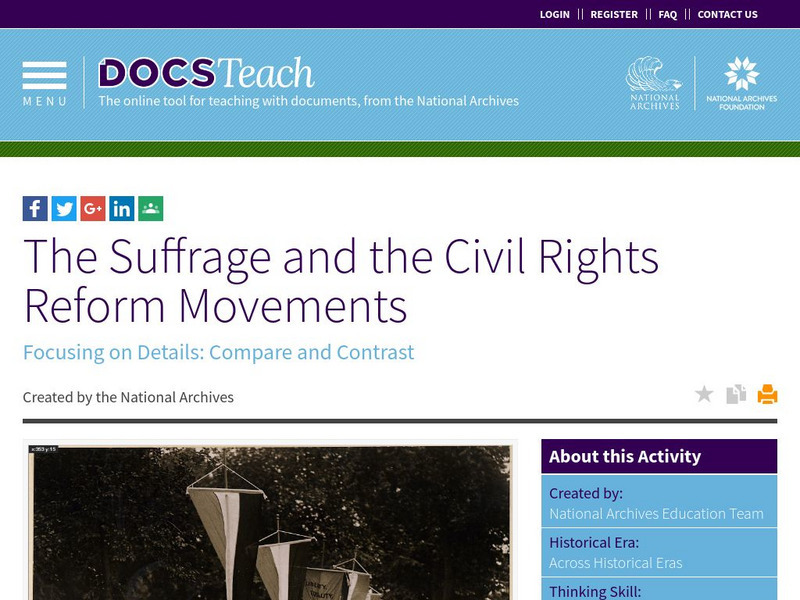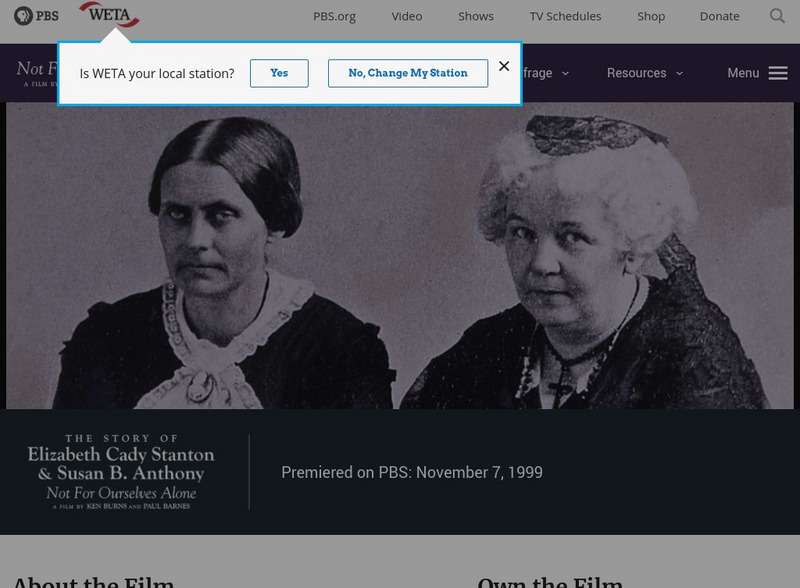National Women’s History Museum
National Women's History Museum: Pathways to Equality
Explore the various reform movements American women participated in during the 19th century.
US National Archives
National Archives: The Suffrage and the Civil Rights Reform Movements
Two reform movements that changed American history - Women's Suffrage and the Civil Rights Movement. View two iconic pictures from these movements and compare and contrast them along with answering critical thinking questions.
National Women’s History Museum
National Women's History Museum: Seneca Falls Convention
Students will examine primary sources about the Seneca Falls Convention in 1848 to understand why a women's rights movement was necessary to gain greater rights for women.
National Women’s History Museum
National Women's History Museum: Woman's Rights Activists During the Civil War
During the Civil War, reformers focused on the war effort rather than organizing women's rights meetings.
National Humanities Center
National Humanities Center: Teacher Serve: 19th Century: Evangelicalism, Revivalism, and the Second Great Awakening
The National Humanities Center offers a thorough text describing the roots and results of the Second Great Awakening. Additional web links and guide for student discussion.
US National Archives
Nara: Teaching With Documents: Political Cartoons
Offers teaching activities, four political cartoons, and a narrative about reforms proposed by three major presidential candidates in 1912: Theodore Roosevelt, William Howard Taft, and Woodrow Wilson.
University of Maryland
Umbc Center for History Education: Reshaping American Society
Using this history lab, students will examine the impact immigration had on urbanization and the reform movements of the time, as well as the addressing the backlash to immigration by understanding nativism.
National Humanities Center
National Humanities Center: Toolbox Library: John Mayfield, Triumph of Nationalism: America, 1815 1850
An essay in which historian John Mayfield claims Americans' evangelical passion is the "religious equivalent of nationalism."
Other
Humboldt Univ.: Political, Economic and Social Consequences of Manifest Destiny
An extensive look at the consequences of manifest destiny, with emphasis on six different topics for student discussions. These include the growth of a national market economy, the impact of drastic economic changes on American society,...
National Humanities Center
National Humanities Center: Teacher Serve: Racial Uplift Ideology in the Era of "The Negro Problem"
History professor Kevin Gaines explores the idea that educated blacks are responsible for the welfare of the majority of the race and how the uplift ideology undermined collective social advancement.
National Women’s History Museum
National Women's History Museum: Sojourner Truth
A former slave, Sojourner Truth was an advocate for abolition, temperance, and civil and women's rights in the 19th century.
National Women’s History Museum
National Women's History Museum: Dorothea Dix
Dorothea Dix was an early 19th century activist who drastically changed the medical field during her lifetime.
National Women’s History Museum
National Women's History Museum: Sarah Moore Grimke
Learn about Sarah Grimke who with her sister fought for abolition and women's rights.
National Women’s History Museum
National Women's History Museum: Catharine Beecher
Catharine Esther Beecher was a nineteenth century teacher and writer who promoted equal access to education for women.
National Women’s History Museum
National Women's History Museum: Sojourner Truth
Learn more about Sojourner Truth, the outspoken advocate for abolition, temperance, and civil and women's rights.
Social Studies Help Center
Social Studies Help Center: Individual's Impact on the Nation's Problems
Find out about the impact of social reformers in the 19th century including women's rights, temperance, care for the mentally ill, and education.
PBS
Pbs: Not for Ourselves Alone
This site, a companion to a PBS program, explores the lives of Elizabeth Cady Stanton and Susan B. Anthony. With ample use of video and audio commentary, the site chronicles their work, their friendship and thus the history of the...
US National Archives
Nara: Charters of Freedom: The Constitution: Amendments 11 27
Check here to read the three amendments passed during the Progressive Era, the 16th, 17th, & 18th amendments. From the National Archives and Records Administration.
US National Archives
Nara: Treasures of Congress: Progressive Reform Votes for Women
Check out this wonderful interactive site from the National Archives and Records Administration, to learn about the women's suffrage movement during the Progressive Era. See photos and primary documents related to the topic (click to...
Curated OER
National Park Service: Elizabeth Cady Stanton
This NPS website contains a biography on Elizabeth Cady Stanton, the driving force behind the 1848 Convention and a leader in the women's rights movement.
National Women’s History Museum
National Women's History Museum: Jane Addams
A progressive social reformer and activist, Jane Addams was on the frontline of the settlement house movement and was the first American woman to win a Nobel Peace Prize.
University of California
The History Project: Ideas and Strategies of the Woman Suffrage Movement
Although the campaign for Woman Suffrage in the United States began with the Seneca Falls Convention of 1848, six decades later the leaders of the movement could claim victories in only four, sparsely-populated Western states, Colorado,...
Department of Defense
Do Dea: Ap Us History: Unit 10: Understanding American History
This extensive learning module looks at how themes of American history can create a better understanding of the big picture of the nation's history.
Curated OER
National Park Service: The Chicano Movement
Site provides information on the major concepts that fueled the Chicano Movement: focus on politics, economic change, education reform, challenging the Catholic Church, cultural renaissance, and Chicano expression.









